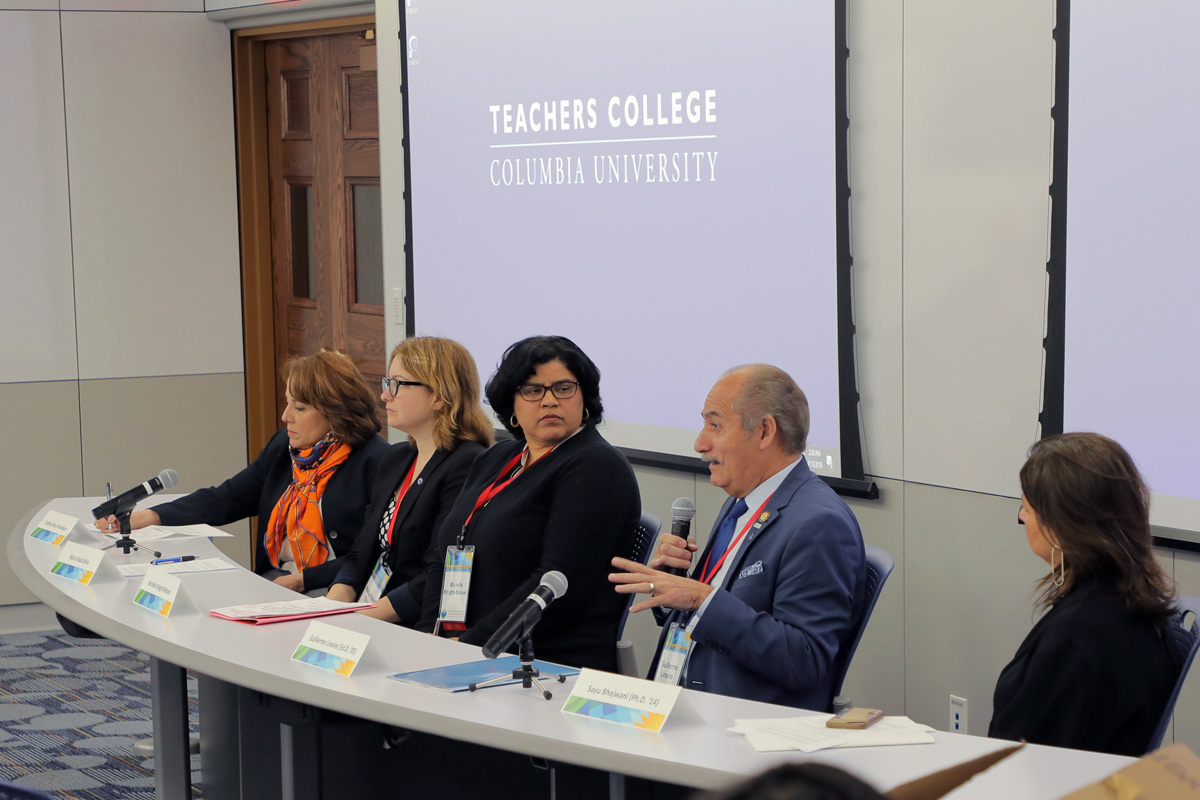Sayu Bhojwani holds a Ph.D. and two master’s degrees from Teachers College, tools that have enabled “the journey I wanted to take.”
But as Bhojwani, born in India, raised in Belize and introduced to the United States as a college student, told her Academic Festival audience, “my journey through TC was my journey through America” – including encounters with bias and racism. During the late 1980s, she and the only other student of color in her teaching cohort were paired for a project on Ebonics (American black English understood as a distinct language rather than a dialect), and they were given field placements in local public schools while other students “were placed in private schools in Rye.”
“I share this because America doesn’t give you a roadmap when you arrive,” said Bhojwani, who, after her TED Talk-style presentation, joined a panel discussion with moderator Michelle Knight-Manuel, TC Associate Dean and Professor of Education; Bhojwani; Guillermo Linares (Ed.D. ’05), Acting President of the New York State Higher Education Services Commission; TC’s Maria Paul Ghiso, Associate Professor of Literacy Education; and Cynthia Rivera Weissblum, President and Chief Executive Officer of the Edwin Gould Foundation.
In the wake of the 9/11 attacks, Bhojwani became New York City’s first Commissioner of Immigrant Affairs. In 2008 she founded, and has since led, New American Leaders, a nonprofit that prepares first- and second-generation Americans to run for public office. In that role and in her recent book, People Like Us: The New Wave of Candidates Knocking on Democracy’s Door (The New Press) she argues that the nation’s government and education systems are “outdated” for an America that looks different than it did it 43 years ago, let alone 243. State legislatures and city councils typically pay poverty wages, a vestige of a time when wealthy white men would take a month away from their farms and plantations to make policy. Today these bodies are composed mainly of those who can afford to serve on them: retirees, lawyers and the independently wealthy – people with little stake in creating a societal safety net or supporting the public schools.
But, Bhojwani concluded, the current moment is also one of “incredible hope. Everyone is suddenly very woke about democracy.” Last year, for example, 69 percent of NAL alumni candidates won their races. “All of us continue to fight for a place at the table, and that makes us the strongest and most optimistic Americans.”
Following Bhojwani’s talk, Knight-Manuel asked the panelists how they understand “winning a seat at the table” in politics or education.
Linares recounted his own evolution from working in a bodega and driving a taxi to attending City College, getting involved with the Civil Rights movement, and eventually getting elected to the local school board. He organized parents to demand bilingual education and oppose busing (“we said, ‘build schools instead’”) and was in the midst of studying to be a principal when the community tapped him to run for office. Later, as the nation’s first Dominican-born elected official, he introduced New York State’s DREAM Act – legislation protecting the children of undocumented immigrants that has finally been approved in Albany – which, in his current position, he now is rolling out.
“For me, it’s about activism and collective action – doing it at the neighborhood level,” he said.
Ghiso, whose award-winning book, Partnering with Immigrant Communities: Action through Literacy (Teachers College Press 2016), chronicles a church-based Philadelphia initiative through which different ethnic communities unite in seeking change in local school and health care resources, said that “winning a seat” begins at an even more elemental level.
“It can be about who’s making decisions in the classroom – because so often curriculum doesn’t reflect the wishes of parents or their cultures and languages,” she said. In her work, Ghiso says, she asks communities what flourishing means to them and what they want education to look like.
Academic Festival 2019
The day included an extensive lineup of presentations, panels and other events featuring TC faculty, students, alumni and staff.
“Families have tremendous informal advocacy networks” and a lot of valuable information as well, she said. “If the system’s not there for you, you have a deep knowledge of what’s wrong.”
Rivera Weissblum said she sees “no other option but to commit to education for underserved students.”
“Emotionally fit and academically prepared – isn’t that our goal for all of our children?” she said, adding a call for the creation of “alliances among school districts, the private sector and the social sector.” She also pulled no punches in acknowledging the realities of American class structure.
“We can’t let up on the pressure for underserved students to enter and graduate from the most prestigious universities,” she said. “It’s there that the power-base has honed its legacy. The leadership class must see more than their own reflections as they walk through those prestigious halls.”
[Read a profile of Bhojwani written for TC Today magazine.]
